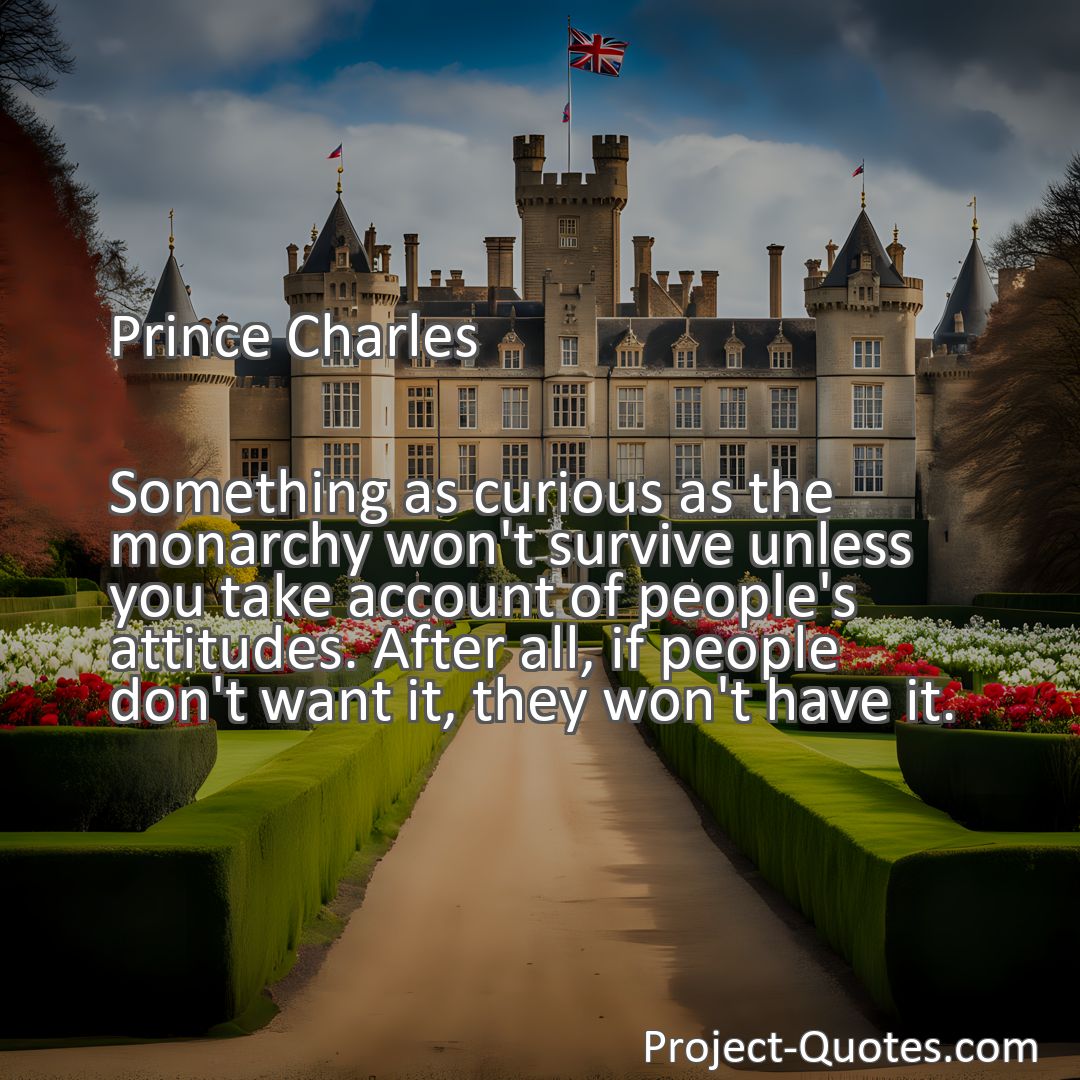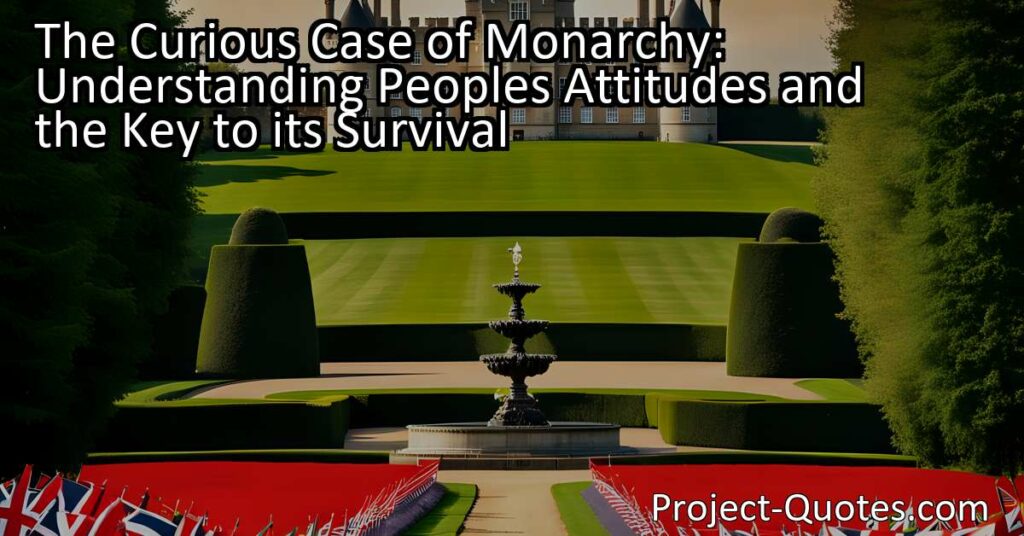Something as curious as the monarchy won’t survive unless you take account of people’s attitudes. After all, if people don’t want it, they won’t have it.
Prince Charles
The Curious Case of Monarchy: Understanding People’s AttitudesThis essay explores the intriguing world of monarchies, emphasizing the significant role that people’s attitudes play in their survival and evolution. While some admire and cherish the traditions associated with monarchy, others question its relevance and consider it outdated. The opinions on monarchy vary greatly across different regions and cultures, influenced by historical context, political climate, economic conditions, and alternative forms of governance. To remain relevant, monarchies must be willing to adapt and cater to the desires, values, and ambitions of their citizens in an ever-changing world.
Table of Contents
- 1 Something as curious as the monarchy won’t survive unless you take account of people’s attitudes. After all, if people don’t want it, they won’t have it.
- 2 Prince Charles
- 3 Meaning of Quote – Something as curious as the monarchy won’t survive unless you take account of people’s attitudes. After all, if people don’t want it, they won’t have it.
- 4 Freely Shareable Quote Image
- 5 Related
Meaning of Quote – Something as curious as the monarchy won’t survive unless you take account of people’s attitudes. After all, if people don’t want it, they won’t have it.
The Curious Case of Monarchy: Understanding People’s Attitudes
Introduction
In his thought-provoking statement, “Something as curious as the monarchy won’t survive unless you take account of people’s attitudes,” Prince Charles highlights the fundamental factor that has shaped monarchies throughout history: the will and acceptance of the people. While the concept of a monarchy might appear peculiar to some, its survival and relevance depend upon the attitudes and desires of the people it governs. This essay will delve into the significance of people’s attitudes in the preservation and evolution of monarchies.
Understanding Monarchy
To fully comprehend the essence of Prince Charles’ quote, we must first understand what a monarchy is. A monarchy is a form of government where a monarch, such as a king or queen, serves as the head of state. They usually maintain their position through inheritance, rather than being elected. Monarchies can be constitutional, where the ruler’s powers are limited by a constitution, or absolute, granting the monarch significant authority. This traditional system can be seen in various countries worldwide and has sparked ongoing debates regarding its relevance and suitability in modern society.
The Curiosity Surrounding Monarchy
Monarchy is indeed a curious arrangement that tends to evoke fascination, skepticism, and intrigue from different perspectives. While some individuals venerate and cherish the traditions associated with monarchy, others question its necessity or even consider it outdated. The idea of someone being born into a position of power and authority may seem incongruous in an era of democratic principles and egalitarian values. However, the preservation and continued existence of a monarchy ultimately rely on the attitudes, beliefs, and sentiments held by the population it governs.
People’s Attitudes: The Key to Monarchy’s Survival
Prince Charles astutely recognizes the importance of people’s attitudes towards monarchy. The institution itself cannot sustain without the support, admiration, and acceptance of the citizens. Throughout history, successful monarchical systems have been built upon the idea of a social contract, whereby the people willingly cede power and allegiance to their monarchs. The willingness of individuals to embrace and endorse monarchy fundamentally influences its survival.
One of the driving forces behind people’s favorable attitudes towards monarchy is often rooted in tradition and cultural heritage. Monarchy often symbolizes centuries of history, identity, and continuity, providing citizens with a sense of stability and unity. Even in constitutional monarchies, where the monarch’s powers are limited, their role as a unifying figurehead and promoter of national pride remains essential.
Moreover, the personal qualities and conduct of the monarch also contribute significantly to the overall perception of the institution. A charismatic and relatable monarch can effectively connect with the populace, inspiring loyalty and fostering a positive image of the monarchy. On the other hand, a detached or controversial monarch may create disillusionment and erode public support.
In many cases, the relevance of a monarchy hinges on its ability to evolve and adapt to changing times. Monarchs who demonstrate a genuine understanding of societal shifts and actively engage with contemporary issues can generate greater public support. For example, Queen Elizabeth II’s reign has been characterized by her remarkable ability to navigate changing social contexts, ensuring the continued relevance of the British monarchy.
Nevertheless, public opinion surrounding monarchy is not uniform and varies greatly across different regions and cultures. Historical context, political climate, economic conditions, and the presence of other viable forms of governance play significant roles in shaping people’s attitudes towards monarchy.
Conclusion
Prince Charles aptly reminds us that the survival and evolution of the curious institution of monarchy ultimately rest upon the attitudes of the people it governs. As societies continue to evolve, so too must monarchies embrace change and cater to the desires, values, and ambitions of their citizens. By acknowledging public opinions and adjusting accordingly, monarchies can effectively adapt and remain relevant in an ever-changing world.
I hope this quote inspired image brings you hope and peace. Share it with someone who needs it today!


